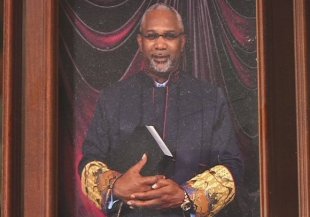In celebration of Freedom of Speech Week (observed October 18-24), I would like to illuminate the life of one of America’s first prominent, outspoken atheists, Charles Chilton Moore, a man who was jailed for blasphemy because the sensitive Bible Belt dwellers of his time just couldn’t stomach a little competition.
When one considers prominent United States atheists, depending on the social circles with which one regularly associates, the list is likely to be rather short. While there are many prominent Americans who consider themselves atheists, very few make their atheism a vocal part of their public dialogue. Such people include authors Daniel Dennett, Sam Harris and Christopher Hitchens; entertainers Penn Jillette and Bill Maher; and university professor PZ Myers. Charles Chilton Moore was a trailblazer for all atheists in the United States, though sadly his story is known by few.
Moore was born in 1837, the grandson of prominent Restoration Movement preacher Barton W. Stone. Moore became an ordained minister, but he lost his faith in the Bible over time, in part due to geological evidence that was contrary to the commonly-held belief in a 6,000 year old Earth. In 1884 Moore founded the Blue Grass Blade, a sporadically-published journal containing articles promoting agnosticism, women’s suffrage, old Earth theory and outing illegal distilling operations and the antics of those he considered religious bigots in his community.
Moore was jailed for five months for blasphemy before his sentence was commuted thanks to a pardon from Republican President William McKinley. As Americans, we often look at blasphemy laws in other nations and scoff at their barbarism. Sadly, many forget the despicable record our own country has with respect to equal treatment of those with different or nonexistent religious beliefs. One need only look at the Salem Witch Trials, the jailing of people for expressing dissenting religious opinions, and the destruction of Mosque construction equipment to catch a small glimpse of our less-than-progressive past.
Moore’s legal battles set many precedents with regards to free speech and the free distribution of publications that contain sentiments contrary to those held by the majority. For those that face hardships today because of their lack of religious belief, it may be comforting to remember the plight of one man who suffered jail time for his lack of belief. Perhaps the next generation of Americans will never experience any form of religious discrimination. We can hope.
To learn more about the life of Charles Chilton Moore, read his biography Kentucky’s Most Hated Man: Charles Chilton Moore and The Bluegrass Blade or his autobiography Behind the Bars (available sparsely).
 Instead, I found a detailed article written by Dr. David DeWitt. My first question was “Doctor of what?” As it turns out, he has a Ph.D. in neuroscience from Case Western Reserve University, and he currently teaches at Liberty University, Virginia’s preeminent “Christian academic community” or as most people may know it, “Jerry Falwell‘s cult college.” How this man came to be one of the 0.1% of scientists that accept a creation account for the source of life on Earth instead of the evolutionary account is not important. I’m more concerned with how this man is able to suspend acceptance of a preponderance of data corroborating evolution in favor of a dogmatic tale of religious creation.
Instead, I found a detailed article written by Dr. David DeWitt. My first question was “Doctor of what?” As it turns out, he has a Ph.D. in neuroscience from Case Western Reserve University, and he currently teaches at Liberty University, Virginia’s preeminent “Christian academic community” or as most people may know it, “Jerry Falwell‘s cult college.” How this man came to be one of the 0.1% of scientists that accept a creation account for the source of life on Earth instead of the evolutionary account is not important. I’m more concerned with how this man is able to suspend acceptance of a preponderance of data corroborating evolution in favor of a dogmatic tale of religious creation.

 As if there weren’t already enough reasons to avoid church, now “avoid contracting HIV” joins the list. Juan Demetrius McFarland, pastor of Shiloh Missionary Baptist Church in Mongtomery, Alabama recently admitted to having had sexual relationships with females in the congregation KNOWING that he had AIDS. He also admitted to mishandling church funds and using drugs which may or may not have been purchased with aforementioned church funds.
As if there weren’t already enough reasons to avoid church, now “avoid contracting HIV” joins the list. Juan Demetrius McFarland, pastor of Shiloh Missionary Baptist Church in Mongtomery, Alabama recently admitted to having had sexual relationships with females in the congregation KNOWING that he had AIDS. He also admitted to mishandling church funds and using drugs which may or may not have been purchased with aforementioned church funds.